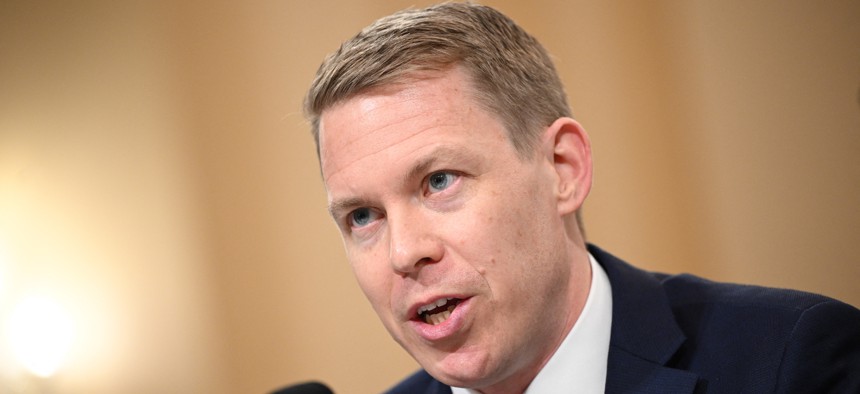
VA CTO Charles Worthington testifies about artificial intelligence before the House Committee on Veterans' Affairs Subcommittee on Health on Feb. 15. 2024. Mandel Ngan/AFP via Getty Images
Lawmakers urge VA to tread carefully with AI
The Department of Veteran Affairs’ 2023 inventory of AI use cases listed over 100 instances where VA is working to use emerging technologies, with at least 40 of those examples in an operational phase.
The Department of Veteran Affairs is already using artificial intelligence and automated tools to enhance the clinical experience for veterans, but lawmakers cautioned VA to carefully adopt emerging technologies in ways that can serve as a framework for the broader healthcare community.
VA officials told members of the House Veterans’ Affairs Subcommittee on Health on Tuesday about some of their early uses of AI for clinical purposes, as well as the game-changing differences the emerging tools could make for veterans’ medical care. But lawmakers also said during the hearing that VA, in particular, has a vital responsibility to carefully implement and enforce oversight practices around the deployment of these novel capabilities.
“VA is the largest healthcare provider in the country,” ranking member Rep. Julia Brownley, D-Calif., said, noting that “its implementation of AI technology can be a model for other health care systems, which makes it all the more important that we ensure VA and other AI users establish best practices, procedures and guardrails.”
Charles Worthington, VA’s chief technology officer and chief artificial intelligence officer, said the department adopted a trustworthy AI framework in July 2023 that aligns with previous executive orders on AI, Office of Management and Budget memos and other federal guidance, and is also working to establish further guardrails around its use of AI.
He noted that the department’s 2023 inventory of AI use cases tracked more than 100 different examples, with 40 of those cases “in an operational phase with examples spanning speech recognition for clinical dictation, to computer vision for assisting with endoscopies, to customer feedback sentiment analysis modeling.”
To build on these efforts and engage with private sector entrepreneurs, Worthington said VA also launched an AI tech sprint last year that will award $1 million in prizes to outside innovators that can help the department use AI to address burnout among healthcare workers, as well as for “assisting with documenting clinical encounters and with extracting information from paper medical records.”
But concerns about the ethical uses of AI for healthcare, as well as how veteran data is being used to power AI algorithms, were top of mind for many lawmakers.
During a House Veterans’ Affairs Subcommittee on Technology Modernization hearing on VA’s use of AI that was held in January, Rep. Matt Rosendale, R-Mont., pressed department officials about whether VA has a responsibility to notify veterans when their data is fed into an AI model. Rosendale, who chairs the technology subcommittee, raised similar concerns on Thursday and asked the VA officials if they have taken any steps to promote transparency around their early AI use cases.
Worthington said officials are currently working with the Veterans Health Administration’s ethics group “to better understand what the approach should be on this topic,” but added that they do not have a specific time frame in mind for implementing a disclosure process.
“Our thinking right now is that the use case inventory is kind of the basis for which we would want to make those disclosures,” he added. “And, obviously, the use case inventory is a pretty technical document. So we're going to need to work to make that understandable to veteran patients so that they can understand how the VA is using AI and how their data may be put into those models.”
NEXT STORY: FTC cracks down on AI impersonation scammers







